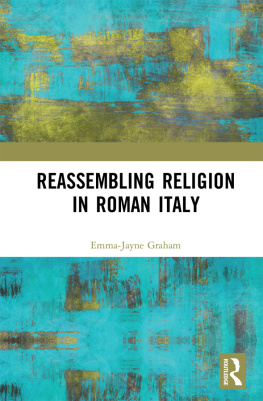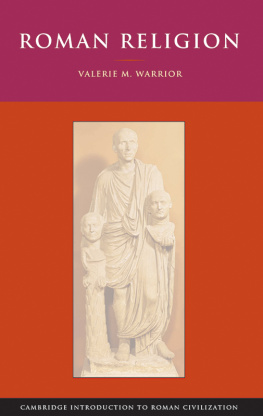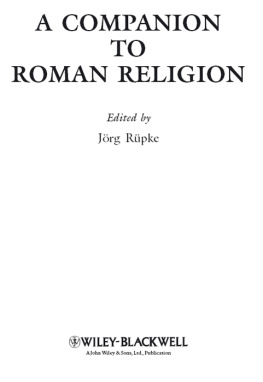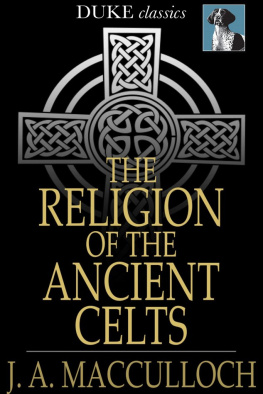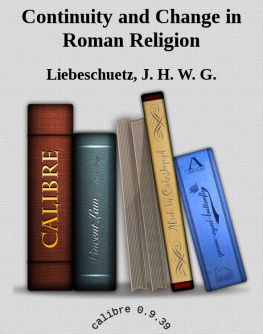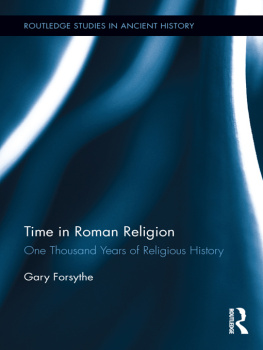Pantheon
A NEW HISTORY OF ROMAN RELIGION
JRG RPKE
TRANSLATED BY DAVID M. B. RICHARDSON
PRINCETON UNIVERSITY PRESS
PRINCETON & OXFORD
Copyright 2018 by Princeton University Press
This is a translation of Pantheon , by Jrg Rpke, Verlag C. H. Beck oHG, Mnchen 2016
Requests for permission to reproduce material from this work should be sent to Permissions, Princeton University Press
Published by Princeton University Press, 41 William Street, Princeton, New Jersey 08540
In the United Kingdom: Princeton University Press, 6 Oxford Street, Woodstock, Oxfordshire OX20 1TR
press.princeton.edu
Jacket design by Chris Ferrante
Jacket photograph Pino DAmico
All Rights Reserved
Library of Congress Cataloging-in-Publication Data
Names: Rpke, Jrg, author.
Title: Pantheon : a new history of Roman religion / Jrg Rpke ; translated by David M. B. Richardson.
Other titles: Pantheon. English
Description: Princeton, N.J. : Princeton University Press, 2018. | Includes bibliographical references and index.
Identifiers: LCCN 2017015360 | ISBN 9780691156835 (hardcover : alk. paper)
Subjects: LCSH: RomeReligion. | ReligionsHistory. | ReligionHistory.
Classification: LCC BL803 .R84513 2018 | DDC 292.07dc23 LC record available at https://lccn.loc.gov/2017015360
British Library Cataloging-in-Publication Data is available
This book has been composed in Arno Pro
Printed on acid-free paper.
Printed in the United States of America
10 9 8 7 6 5 4 3 2 1
CONTENTS
LIST OF ILLUSTRATIONS
ACKNOWLEDGMENTS
AT THE CORE OF THIS BOOK lies the conviction that a survey of the history of ancient religion that does not take collective actors such as Rome or the Romans as its starting point, but rather individual actors and how they lived religion, produces not only a different view of religion, but above all a new awareness of the mutability of religious conceptions and practice. My own research and the chance to work with the team comprising Marlis Arnhold and Benjamin Sippel (who supported me in the selection of illustrations), Christopher Degelmann, Valentino Gasparini, Richard Gordon (whom I owe thanks for more than a decade of intense exchange), Maik Patzelt, Georgia Petridou, Rubina Raja (who co-directed the project), Anna-Katharina Rieger, Lara Wei, and finally Emiliano Urciuoli and Janico Albrecht, made possible by an Advanced Grant from the European Research Council (no. 295555), enabled me to put that conviction to the test. That teams share in the outcome distinctly exceeds what I have been able to indicate in the notes and the bibliography. This also applies to the many colleagues who have collaborated in this undertaking, as contributors to meetings, as guests at the Max Weber Centre, as fellows of the research group Religious Individualization in Historical Perspective, financed by the Deutsche Forschungsgemeinschaft (German Science Foundation, no. KFOR 1013), or as co-editors of the journal Religion in the Roman Empire , which arose from this project. I mention by name here Roberto Alciati (now preparing an Italian translation together with Maria dellIsola), Clifford Ando, Michal Bar-Asher Siegal, Eve-Marie Becker, Elisabeth Begemann, Anton Bierl, Malcolm Choat, Nicola Denzey-Lewis, Ulrike Egelhaaf-Gaiser, Esther Eidinow, Cristiana Facchini, Harriet Flower, Jonas Grethlein, Ingvild Gilhus, Simon Goldhill, Manfred Horstmannshoff, Maria dellIsola, Julia Kindt, Karen King, Patricia McAnany, Harry Maier, Teresa Morgan, Maren Niehoff, Vered Noam, Valeria Piano, Ilaria Ramelli, Federico Santangelo, Gnther Schrner, Seth Schwartz, Marco Francisco Simn, Christopher Smith, Darja terbenc Erker, Guy Stroumsa, Ann Taves, Zsuzsanna Vrhelyi, Jutta and Markus Vinzent, Katharina Waldner, and Greg Woolf. Collaboration with the latter was supported by the Alexander von Humboldt Trust with its funding for research on sanctuaries. Jan Bremmer, Max Deeg, Martin Fuchs, Valentino Gasparini, Bettina Hollstein, Ute Hsken, Antje Linkenbach, Katharina Rieger, Veit Rosenberger (who died just a few weeks afterward and is still missed at the Center), and Michael Stausberg took the trouble to discuss the entire text with me in July 2016. My sincere thanks to all those named!
Ursula Birtel-Koltes and Diana Pschel created the organizational infrastructure for the work. Katharina Waldner took over more than my teaching duties, so freeing me of other obligations. The management team at the Max Weber Centre for Advanced Cultural and Social Studies, Bettina Hollstein, Wolfgang Spickermann, and then Hartmut Rosa, and the presidents and chancellors of the University, Kai Brodersen and Michael Hinz, Walter Bauer-Wabnegg and Thomas Gerken, supported the project in every conceivable way. My sincere thanks go to them all, and to the staffs at the funding organizations. Sarah Al-taher and Karoline Koch tirelessly sought out literature and incorporated it into the bibliography. I thank them too, and the British School at Rome with its director Christopher Smith, who provided me with a safe harbor during the final editing process.
David Richardson has again undertaken the translation of the text from its original German. I am grateful to him for his care and critical feedback. The same holds true for Eva Jaunzems who smoothed the text for an ever broader audience. My thanks to Maik Patzelt and Janico Albrecht for compiling the index.
The book would not have taken its present form if Al Bertrand of Princeton University Press and Stefan von der Lahr at C.H. Beck had not persuaded me that it should be configured both as a narrative of religious changes and as an examination of the mechanisms of religion in antiquity in general.
Erfurt
Summer 2017
I
A History of Mediterranean Religion
1. What Is Meant by a History of Mediterranean Religion?
It is the intention of this book to tell the story of an upheaval epochal in its impact. This is the story of how a world well beyond the understanding of most of us was transformed into a world very like our own, at least in one particular. To put it succinctly: we will describe how from a world in which one practiced rituals , there emerged a world of religions , to which one could belong. This is no straightforward story. The changes I shall relate were not inevitable; no one could have foreseen them. Nor were they irreversible: quite the contrary.
To speak of religionsin the pluralseems to us today quite normal. We may in fact define ourselves in terms of a religion. A religion may open doors for usaccess to officialdom, to the mass media, to tax offices when it is a question of tax exemptionsor in some cases the doors of a prison. But, although we as individuals may belong to one religion, we can no longer unthink the plural form of the term as a concept for describing both present-day and historical societies. And yet, with ever-greater frequency, trends arise that defy such categorization. New Age has been one such concept. Spirituality increasingly appears to be another, and mysticism has a long history as a phenomenon of this kind. Countless Christians, Muslims, and Hindus talk quite straightforwardly of themselves as belonging to one (only rarely several) of many religions, but there are good grounds for wondering whether, in many cases, we should not speak of culture and cultural differences rather than of membership of different religions.
When a concept has many different meanings, windows of comparison are opened across space and time, and in many cases it is only then that a meaningful conversation becomes possible. A history, moreover, can be communicated successfully only when the number of concepts in play is limited, when recognizability is vouchsafed to all participants, despite small differences; otherwise, we are faced with a multitude of disparate, sometimes conflicting histories, with results that may be entertaining (think only of the Thousand and One Nights), and thoroughly informative and revealing (a thousand every-day stories adding up to a microhistory), but with no end, no moral. This is all the more true of a long history such as the one being attempted here, where the actors change repeatedly, or at least often more frequently than the parameters of religious practices and concepts.
Next page


